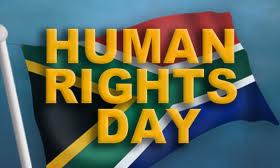Human Rights Day
Human rights are rights that all humans should have regardless of their historical and social situations. In 1948, the United Nations defined 30 articles of human rights founded on the basis of freedom, justice, and peace. South Africa supports the Universal Declaration of Human Rights and we celebrate Human Rights Day on the 21 March.
Human Rights Day in South Africa is linked with 21 March 1960, and the events of Sharpeville. On that day 69 people died and 180 were wounded when police fired on a peaceful crowd that had gathered to protest against the Pass laws. It was an affirmation by common people, rising in unison to proclaim their rights, and it became an iconic date in our country’s troubled history.
The Native Laws Amendment Act of 1952 determined black person could not enter an urban one without a permit from the local authorities. The Pass included a photograph, details of place of origin, employment record, tax payments, and encounters with the police. It was a criminal offence to be unable to produce a Reference Book when required to do so by the police.
On 21 March 1960 black men were to gather at Sharpeville without their reference books and present themselves for arrest. The order was given to disperse, after which the Police opened fire with sharp-point ammunition on the crowd of men, women and children. Following the Sharpeville massacre, a number of black political movements were banned by the Nationalist government.
When the democratically elected government took office, 21st March was instituted as the South Africa Human Rights Day. On Human Rights Day, South Africans are asked to reflect on their rights and how to protect themselves against violations.
Human Rights Day reminds us of the suffering and loss of life that accompanied the most recent struggle for human rights in South Africa, but it also highlights the slavery of the Colonial era. It is why we must also ensure that modern forms of slavery such as human trafficking and forced labour are addressed and eradicated.
What are your human rights?
- The right to life, equality and human dignity.
- The right to citizenship and security.
- The freedom of assembly, association, belief, opinion and expression.
- The right to be free of forced labour, servitude and slavery.
- The right to privacy
- The right to exercise political rights
- A right to access to information and just administration action.
- Protected rights include a healthy environment; housing, health care, food, water and social security.
- A right to freedom of movement and residence and of trade, occupation and profession.
- In the workplace everyone has a right to engage in trade unions and labour movements.
- The right to a basic education.
- The right to language and culture and communities
- The freedom of religion and belief.


